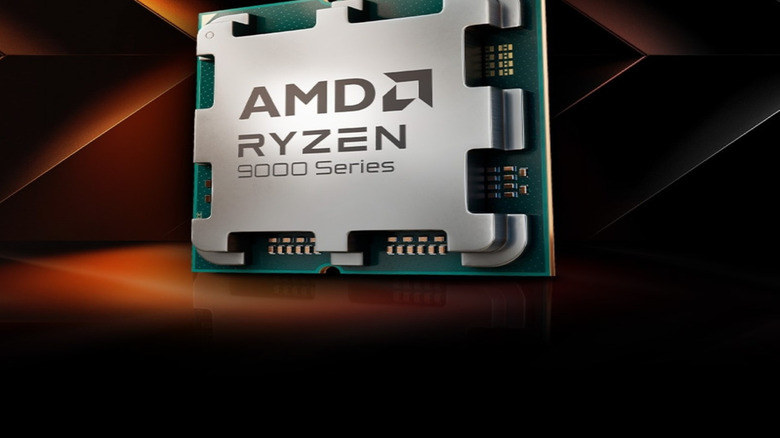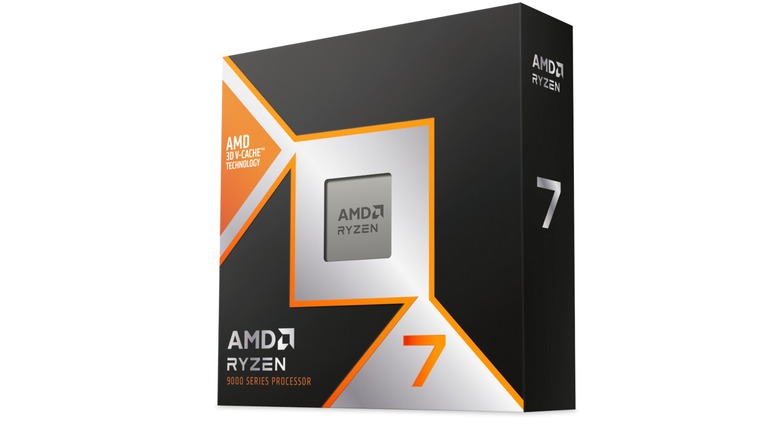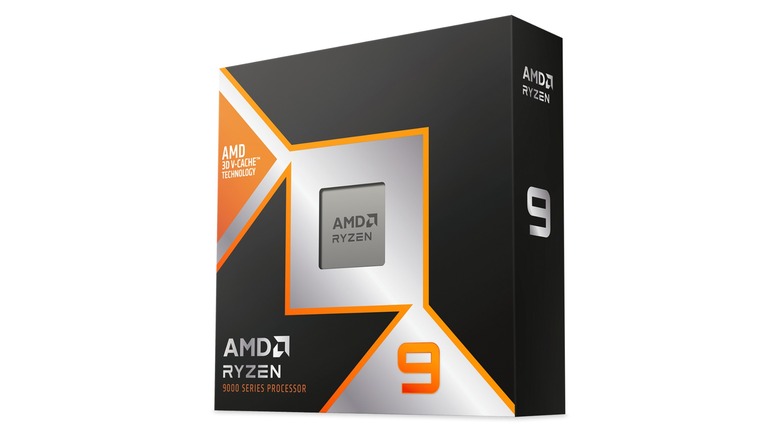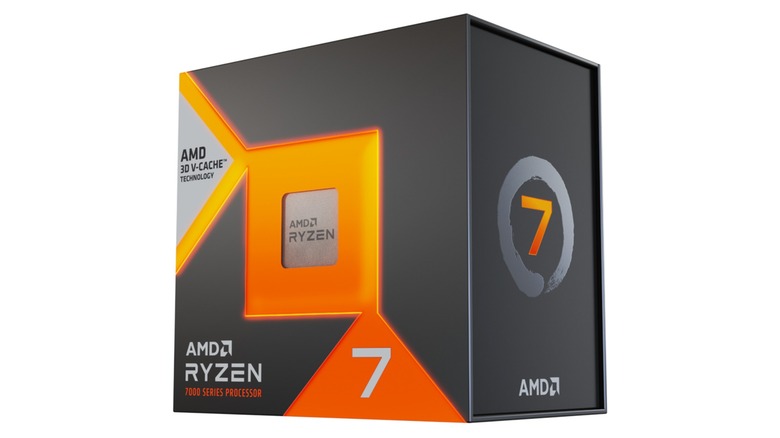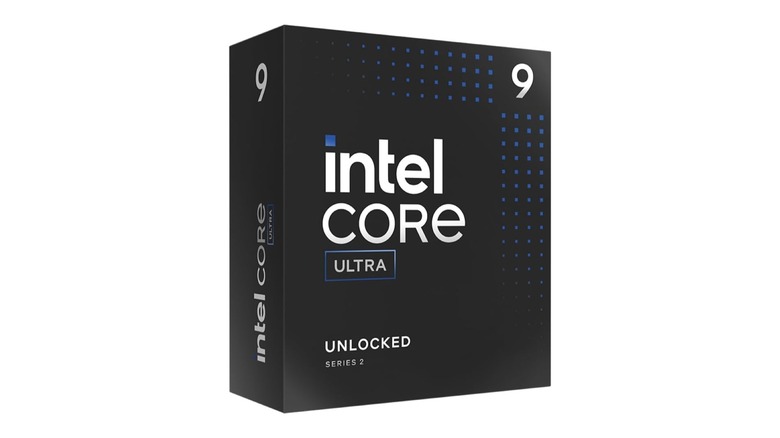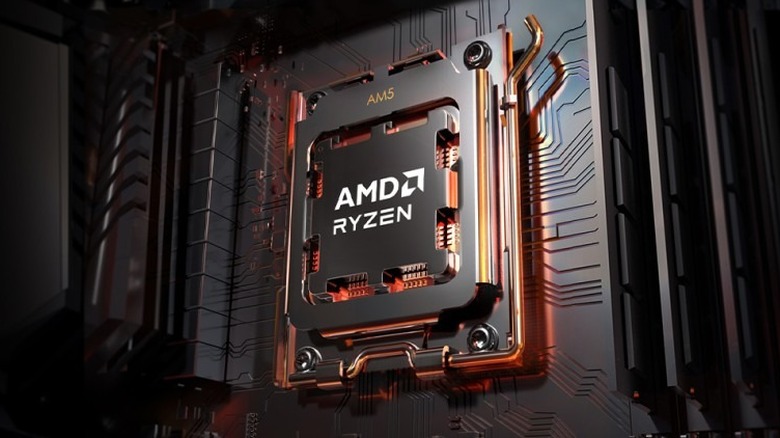What's A Good Alternative To The Ryzen 7 9800X3D Gaming CPU?
We may receive a commission on purchases made from links.
Since its release in November 2024, the AMD Ryzen 7 9800X3D desktop CPU has proven to be the hottest AMD CPU for PC gamers. Not literally, as its thermal performance is one of many qualities that make it so great, but in the sense that it has such a positive reputation that stores have had trouble keeping it in stock. So, what should you do if you can't get your hands on one? Or if you don't want to use an AMD CPU, is there an Intel alternative?
As powerful as the Ryzen 7 9800X3D has proven itself to be, it's not the only processor on the market that can keep your frame rates up in "Cyberpunk 2077" and other demanding titles. In fact, AMD has even surpassed its own gaming king with an even newer processor, and Intel has chips that shouldn't be slept on, either. There are definitely some great 9800X3D alternatives on the market that should make most PC owners very happy.
As one of SlashGear's resident PC hardware writers with years of hands-on PC building experience — plus decades of PC gaming — I know what it's like to find yourself frustrated by out of stock parts. I've rounded up the processors most likely to satisfy those in the market for a 9800X3D. To be clear, there's no such thing as an exact substitute for any particular CPU. Every processor has its own set of strengths and weaknesses. The processors mentioned in this article are for those who want something generally in the same ballpark as the 9800X3D.
What makes the Ryzen 7 9800X3D so good?
When it comes to the age old AMD vs. Intel rivalry, Intel has lagged behind recently. AMD's Ryzen X3D processors are beloved by gamers for their enhanced graphical performance and thermal efficiency. AMD's proprietary 3D V-Cache technology piles layers of L3 memory on top or underneath the die itself (depending on generation), which not only increases the overall size of the cache, but allows the chip to rely more on that cache, thereby reducing the reliance on system memory, which is comparatively sluggish. The Ryzen 7 9800X3D is a Zen 5, 8-core, 16-thread chip with a 120 watt thermal design power (TDP), a 4.7 gigahertz base clock and up to 5.2 gigahertz boost. It's been a golden child among AMD's CPU offerings. It consistently vies for the top spot in benchmarking charts and underwent a shortage in late 2024 as gamers rushed to stuff this dynamo into their rigs.
The Ryzen 9800X3D starts on a high note with 96 MB of AMD's second generation 3D V-Cache, which puts extra memory underneath the die to help it rip through frames by passing information to the GPU at lightning speeds. And, in a mic-drop moment, this was the first fully unlocked X3D processor, allowing users to manually overclock it for even more performance.
However, as great as the 9800X3D can be, AMD has since one-upped it, and it doesn't perform as well in normal productivity tasks as other processors. There are other, comparable CPUs that may be a better — or at least comparable — fit for you, depending on your needs.
AMD Ryzen 9 9950X3D
Is the Ryzen 7 9800X3D no longer AMD's best processor for gaming? Big Red recently dropped the Ryzen 9 9950X3D, which is its top-of-the-line, no holds barred gaming CPU... or, at least, it's supposed to be. The truth is a bit more complex, but this is still the better choice for productivity, as its 16-core, 32-thread, Zen 5 architecture provides serious multitasking chops. 128 megabytes of second generation 3D V-Cache add gaming speed, matched with a TDP of 170 watts, and a base clock of 4.3 gigahertz (up to 5.7).
Despite its beefy specs, the 9950X3D is still neck and neck with its younger sibling in gaming benchmarks from Gamer's Nexus. In PerformanceTest benchmark aggregates from PassMark, the less powerful chip even outperforms it. Even so, both chips represent the pinnacle of gaming CPUs in 2025, and the 9950X3D is the closest equivalent to the 9800X3D for that purpose.
Productivity is where this chip makes the 9800X3D look like a chihuahua next to a race horse. With multi-threaded and non-graphical tasks, it muscles aside not only the 9800X3D but also the new Intel Core 9 285K in multi-threaded performance benchmarks from Tom's Hardware. TechPowerUp found similar results, where the 9950X3D consistently pulled ahead of the competition in all productivity benchmarks, except photo or video editing, and 3D modeling.
Another area this chip falls short in is price. At an MSRP of $700, it's one of the most expensive consumer CPUs on the market. At over $200 less, the Ryzen 7 9800X3D is far better value per-dollar.
AMD Ryzen 7 7800X3D
The budget alternative to the AMD Ryzen 7 9800X3D is the CPU it was designed as a sequel to, the Ryzen 7 7800X3D. While it's a generation old, it's still hanging close to its successor in benchmarks, which we'll get to in a moment. Like the 9800X3D, the 7800X3D has 8 cores, 16 threads, 96 megabytes of first generation 3D V-Cache, and a TDP of 120 watts. It is, however, built on the older Zen 4 architecture with a 5 nanometer process. However, the few differences that separate it from the 9800X3D on paper do not mean its performance is significantly less impressive.
While the 9800X3D sometimes saw significant frame rate boosts over the 7800X3D in gaming tests by Gamer's Nexus, the older chip consistently placed second or third in those benchmark shootouts, beating the beefier Ryzen 9 7950X3D in several instances. It even beat the 9800X3D in some efficiency tests. However, like that newer chip, the 7800X3D is not particularly partial toward productivity tasks. In tests by Tom's Hardware, both CPUs sank toward the bottom of the charts in multi and single threaded performance. These aren't dips you'll notice in basic office tasks, but enough to make you keep an eye on how many Chrome tabs you have open. However, that goes for both of these chips to some degree.
What makes the 7800X3D especially compelling is its price, which is down to $399 on Amazon at the time of writing. It could absolutely be worth the savings given that there's not a ton of daylight between the two chips' performance.
Intel Core Ultra 9 285K
Intel lost the CPU crown to AMD, but it does offer the Core Ultra 9 285K to compete with the Ryzen 7 9800X3D. Let's get this out of the way: the 285K gets steamrolled in gaming performance by the 9800X3D, with Hardware Unboxed finding it incapable of beating AMD's gaming champion in 45 titles. Even the older Ryzen 7900X3D beats it according to PassMark's PerformanceTest aggregates. Let me be clear: the AMD CPUs we've covered above are the better choice for gaming. The Core Ultra 9 285K is on this list because, if you don't want to use an AMD platform, this is your closest Intel alternative.
The Core Ultra 9 285K is a 24-core processor made up of 8 performance cores and 16 efficiency cores, with 24 threads. It clocks up to 5.7 gigahertz but has a base clock between 3.2-3.7 depending on efficiency or performance core engagement. It has a base TDP of 125 watts but can be overvolted up to 250 watts. There are also 36 TOPS of AI computing power onboard.
The Core Ultra 9 285K does start to flex a bit when it comes to productivity. Tom's Hardware shows it hanging with AMD's big dog, the Ryzen 9 9950X3D we discussed above, with slightly lower scores than that chip in multi-threaded performance and slightly higher in single-threaded, which has long been Intel's relative strength.
Of course, if you have a motherboard with an AMD Zen 5 CPU socket, it won't be compatible with an Intel processor. You'll need to either build with an Intel-compatible motherboard, or stick with AMD.
Methodology
The CPUs listed in this article were selected based on their non-exact similarity to the AMD Ryzen 7 9800X3D desktop CPU in terms of gaming and productivity performance. Performance was determined by relying on rigorous, publicly available testing, performed by reputable hardware reviewers. Benchmarks and impressions from those tests were considered in tandem with the writer's general knowledge of the PC component market.
